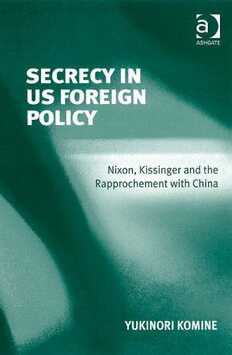
Secrecy in US Foreign Policy PDF
300 Pages·2008·1.595 MB·English
Most books are stored in the elastic cloud where traffic is expensive. For this reason, we have a limit on daily download.
Preview Secrecy in US Foreign Policy
Description:
This title examines the pursuit of strict secrecy by President Nixon and his National Security Advisor Kissinger in foreign policy decision-making as a principle characteristic of the US rapprochement with China. Moreover it sheds new light on the complexity and dynamism of the evolution of new China initiatives and demonstrates the existence of many policy options and different perspectives among US officials.It focuses on three major elements of the US rapprochement with China: conception - the presidential leadership, the revitalization of the National Security system and secrecy in bureaucratic rivalry; implementation - the evolution of policy option studies and the private signal exchange; and, direct talks - the major security issues during the behind the scene talks in Kissinger's trips to Beijing and Nixon's trip to China.Original and compelling, this book looks at the similarities and differences between Nixon's and Kissinger's views on China and the rivalry between them and the State Department regarding the timing and issues of US negotiations with China. Newly declassified materials help to identify key questions and highlight the dynamics of events to make this study suited to courses on foreign policy analysis, Cold War history and East Asian studies.
See more
The list of books you might like
Most books are stored in the elastic cloud where traffic is expensive. For this reason, we have a limit on daily download.
